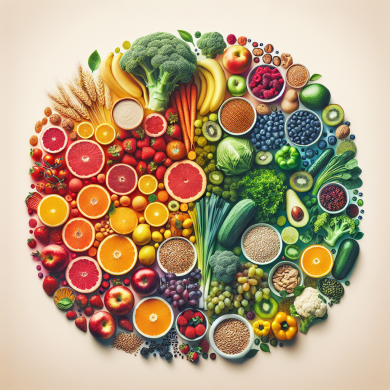Smart Clean Eating: Budget-Friendly Strategies
“`html
Introduction to Smart Clean Eating
In recent years, clean eating has become a popular concept among health enthusiasts, emphasizing whole, minimally processed foods. However, many people associate clean eating with high grocery bills, assuming that maintaining a healthy diet requires spending a lot of money. The truth is, with some strategic planning and smart choices, it’s entirely possible to eat clean without breaking the bank. This article will explore budget-friendly strategies for smart clean eating, enabling you to nourish your body and mind without compromising your financial health.
Understanding Clean Eating
Clean eating revolves around consuming foods that are as close to their natural state as possible. This means focusing on whole grains, lean proteins, fruits and vegetables, healthy fats, and avoiding highly processed foods laden with additives and preservatives. Clean eating encourages mindfulness about food origins and preparation methods, fostering a healthier relationship with what we consume.
The Benefits of Clean Eating
1. **Improved Nutrient Intake**: Whole foods are rich in essential nutrients like vitamins, minerals, and antioxidants.
2. **Better Digestion**: Consuming fiber-rich foods supports healthy digestion and regular bowel movements.
3. **Sustained Energy Levels**: Whole foods provide a steady release of energy, preventing spikes and crashes associated with processed foods.
4. **Weight Management**: Clean eating promotes a balanced diet that can aid in achieving or maintaining a healthy weight.
5. **Mental Well-being**: Nutrition plays a crucial role in brain health, and clean eating can enhance mood and cognitive function.
Budget-Friendly Strategies for Clean Eating
Plan Your Meals
Meal planning is an essential strategy for eating clean on a budget. By planning your meals for the week, you can make informed decisions about what to buy, reducing the likelihood of impulse purchases. Here’s how to start:
– **Create a Weekly Menu**: Choose recipes that utilize similar ingredients to minimize waste. For example, if a recipe calls for half an onion, plan another meal that uses the remaining half.
– **Make a Shopping List**: List the necessary ingredients and stick to it while shopping to avoid buying unnecessary items.
– **Batch Cooking**: Prepare larger portions of meals and freeze leftovers for future use. This not only saves time but also ensures you have healthy meals ready when needed.
Shop Smart
Being a savvy shopper can significantly reduce your grocery expenses. Here are some tips to help you shop smart:
– **Buy in Bulk**: Purchasing staples like grains, legumes, and nuts in bulk can be more cost-effective than buying pre-packaged versions.
– **Choose Store Brands**: Store brands often offer the same quality as national brands at a lower price.
– **Shop Seasonal Produce**: Fruits and vegetables are usually more affordable when they’re in season. Visit local farmers’ markets for fresh, seasonal produce at competitive prices.
– **Utilize Coupons and Discounts**: Look for coupons or discount codes, and consider loyalty programs offered by grocery stores to save money on your purchases.
Focus on Affordable Superfoods
Some nutrient-dense foods, known as superfoods, can be expensive, but there are budget-friendly options that offer similar benefits:
– **Oats**: Rich in fiber and versatile in use, oats are an affordable superfood perfect for breakfast or baking.
– **Beans and Lentils**: These legumes are excellent sources of protein and fiber, making them a cost-effective alternative to meat.
– **Frozen Berries**: While fresh berries can be pricey, frozen options are budget-friendly and retain their nutritional value.
– **Sweet Potatoes**: Packed with vitamins, minerals, and antioxidants, sweet potatoes are a nutritious and inexpensive choice.
Reduce Food Waste
Minimizing food waste is a crucial component of budget-friendly clean eating. Implement these practices to make the most out of what you buy:
– **Proper Storage**: Store perishable items correctly to extend their shelf life. For instance, keep leafy greens in a sealed container with a paper towel to absorb excess moisture.
– **Repurpose Leftovers**: Transform leftovers into new meals. For instance, leftover roasted vegetables can be added to salads or omelets.
– **Compost Scraps**: If you have a garden, composting food scraps can enrich your soil, reducing waste and supporting sustainable practices.
Embrace Plant-Based Meals
Incorporating more plant-based meals into your diet can be both healthful and economical. Plant-based foods are often less expensive than meat and dairy products, and they offer a wide range of nutrients. Consider these tips:
– **Meatless Mondays**: Dedicate one day a week to plant-based meals, which can reduce your grocery bill and introduce new recipes into your rotation.
– **Use Meat as a Condiment**: Instead of making meat the centerpiece of your meal, use it sparingly as a flavor enhancer, such as adding a small amount of bacon to a vegetable dish.
Sample Budget-Friendly Clean Eating Meal Plan
To demonstrate how these strategies come together, here’s a sample meal plan for a day of budget-friendly clean eating:
Breakfast
– **Overnight Oats**: Combine oats with almond milk, chia seeds, and a spoonful of peanut butter. Top with frozen berries before serving.
Lunch
– **Lentil Soup**: Cook a large batch of lentil soup with carrots, celery, onions, and canned tomatoes. Serve with whole-grain bread.
Dinner
– **Vegetable Stir-Fry**: Sauté seasonal vegetables with garlic, ginger, and soy sauce. Serve over brown rice and top with a sprinkle of sesame seeds.
Snacks
– **Hummus and Carrot Sticks**: Pair homemade hummus with carrot sticks for a nutritious and filling snack.
– **Apple Slices with Almond Butter**: Slice an apple and dip in almond butter for a sweet and satisfying treat.
Conclusion
Eating clean on a budget is not only possible but also enjoyable. By planning meals, shopping smart, focusing on affordable superfoods, reducing food waste, and embracing plant-based meals, you can maintain a nutritious diet without straining your finances. With these strategies, smart clean eating becomes a sustainable lifestyle choice, promoting health and well-being while respecting your budget. Remember, clean eating is a journey, and every small step you take contributes to a healthier you and a healthier planet.
“`















Add comment